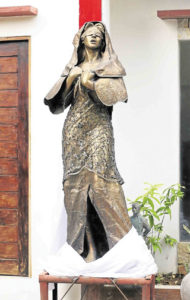
A bronze statue depicting a “comfort woman” was taken down on Sunday, December 30, 2018 in the Laguna province after the Japanese government expressed disappointment in its construction.
The statue — reported to have been a one-meter tall seated girl with a vacant chair next to her — was unveiled just two days before on Friday, December 28, 2018.
“We believe that the establishment of a comfort woman statue in other countries, including this case, is extremely disappointing, not compatible with the Japanese government,” said the Japanese government, as reported by the Manila Shimbun.
Salvador Panelo, the Philippine Presidential Spokesperson and Chief Presidential Legal Counsel, responded in a statement and said the statue was not the work of the Philippine government, but of private entities and was thus “freedom of expression.”
“The statute subject of this current issue was commissioned using private funds and was built inside private property,” Panelo said in a statement Tuesday, January 1.
“This, therefore, forms part of freedom of expression and the government cannot simply delimit or restrain the exercise of such right without a tenable purpose — the aforesaid right being protected by our Constitution,” added Panelo.
Before being removed, the statue stood in a Catholic-run shelter in San Pedro, Laguna.
An inscription on the statue read, “The monument gives recognition, respect, equal protection and empowerment to women of yesterday, today, and future. It also symbolizes peace and true friendship of all nations in the world.”
Comfort women statues
“Comfort women” date back to before and during World War II and refer to the women who were assaulted and raped during the Japanese occupation. Most women were from Korea, while others came from other countries such as the Philippines.
Though Japan and South Korea made an agreement on the issue late 2015 in which Japan was required to “issue a statement of regret” and compensate the victims, numerous statues remain erected in places including South Korea, Germany, Australia, New Jersey, and California.
Referring to another statue that was removed from Roxas Boulevard in Manila last April 2018, Panelo said the removals were made under different circumstances.
The statue in Laguna, he said, “appears to be simply dedicated to peace and women empowerment,” as opposed to the one along Roxas which was built to “memorialize a dark and internationally sensitive part of our people’s history during the great war.”
In saying that the public should commemorate the sacrifices of Filipinos made during World War II, he added that people should “refrain from unduly politicizing an issue which has already been addressed.”
“As then remarked by the president, it would only be counterproductive to antagonize Japan, which has since proven itself to be a strategic and reliable ally and partner, by politicizing the issue,” added Panelo.
Japan remains among the Philippines’ top allies and remains its top provider of Official Development Assistance.
“Japan, after all, has paid dearly for its past deeds, which includes giving reparations,” said Panelo.





